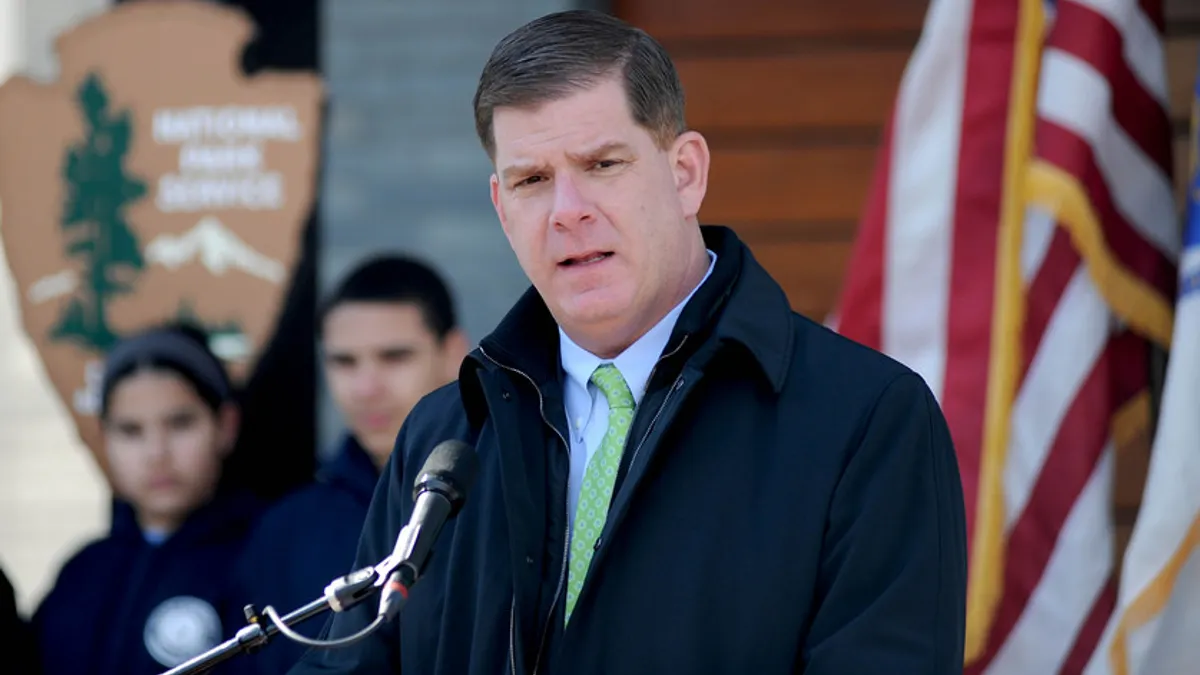Dive Brief:
- Boston Mayor Marty Walsh, nominee for secretary of labor, said Thursday he supports several of President Joe Biden's workplace priorities, including safety and equity, during a mostly cordial confirmation hearing before the U.S. Senate.
- Walsh spoke on topics including emergency workplace standards during the COVID-19 pandemic. He was asked early in the hearing by Sen. Richard Burr, R-N.C., to discuss the regulatory oversight of the Occupational Safety and Health Administration, which recently issued guidance for employers. "OSHA should not be an us versus them," he said. "OSHA is part of an agency that should be there to protect workers on the job site."
- Walsh also discussed the importance of community colleges and training programs in creating pathways to employment, as well as the importance of advancing equity. "A big part of [the] economy of the future are women and people of color," he said. "One of my top priorities … is to work with each and every one of you to make sure that every American worker gets the opportunity to be successful." He also expressed support for a $15 per hour federal minimum wage but added that the president wants "bipartisan support" on the issue moving forward.
Dive Insight:
Biden previously stated an intention to be the "strongest labor president you ever had" and, if confirmed, Walsh is likely to play an important role in the administration's workforce agenda.
Some Republican senators questioned Walsh, a former union president, on his support of the Protecting the Right to Organize Act, or PRO Act. The bill, first introduced by Congressional Democrats in 2019, would add legal protections for labor unions; undo a U.S. Supreme Court ruling that upheld employers' right to require that employees arbitrate their disputes individually and waive their right to class or collective actions; and redefine joint employment under the National Labor Relations Act in what would be a reversal of policies implemented by the National Labor Relations Board under former President Donald Trump.
One criticism of the Act from employer advocates is that it would interfere with state governments that have enacted "right to work" laws that generally state workers may not be compelled to join, or not to join, a labor union or pay dues to a union. Sen. Roger Marshall, R-Kan., said Biden's opposition to right to work laws amounted to "upending state constitutions" and asked Walsh if he believed workers had the right to choose whether they wanted to be in a union.
"We need to continue to strengthen the American worker," Walsh said, "I think the worker has every right to choose what they believe." But he also called the PRO Act "one step closer to helping people organize freely."
Multiple senators asked Walsh about how we would address the nation's state unemployment infrastructure, given the pressure placed on states' systems by the pandemic. Walsh emphasized the need to upgrade technological capabilities; "some of the systems our states are working on are antiquated," he said. He added that governments need to make it easier for unemployed workers to access benefits.
Walsh said OSHA is "one of the first and top priorities for me," and he agreed with Biden's plan to increase the number of inspectors at the agency. He also pointed to the need for job training programs to help workers displaced by the pandemic, and he said the labor department would pursue collaborations with agencies including the U.S. Departments of Commerce and Education, in order to create training opportunities.
"These are not just policies to me," Walsh said. "I live them. Millions of American families need them."












